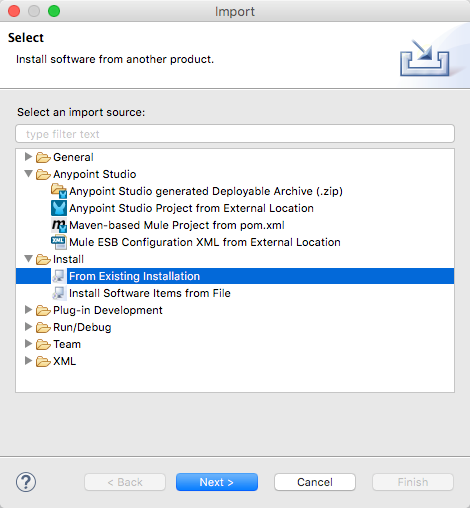Mule Runtime
Anypoint Studio 6.6 with Mule Runtime Engine 3.9.2 Update Site 1 Release Notes
June 14, 2019
Build ID: 201906072050
Compatibility
Version: 3.9.2 EE |
|
Anypoint Studio |
Version: 6.6.1 |
APIkit |
Versions: 3.9.3 |
DataWeave |
Version: 1.2.0 |
MUnit |
Version: 1.6.1 (munit-studio-plugin) |
SAP Connector |
Versions: 3.2.1 |
Eclipse |
Versions: 4.7.2 |
What’s New
The 6.6.1 Studio release includes a number of bug fixes and comes with Mule 3.9.2 runtime.
Hardware Requirements
-
MuleSoft recommends a minimum of 4GB RAM on a developer workstation. As applications become complex, consider adding more RAM.
-
2GHz CPU
-
10GB free hard drive space
Software Requirements
Java Environments |
This version of Anypoint Studio requires Java 8 to run properly.
|
Operating Systems |
|
|
Running real-time antivirus protection software on your operating system might have a negative impact on Anypoint Studio performance. Although this issue is prominent on Windows, it also occurs on Linux and macOS. Although the steps to solve these performance issues vary depending on your antivirus software, a typical solution is to either allow or exclude the Anypoint Studio and java executables, the Studio install and workspace filesystem locations, or some combination of both. See examples of solutions for McAfee Viruscan, Windows Defender, and Symantec Endpoint Protection. |
Migration Guide
Since this version of Anypoint Studio upgrades its core Eclipse version, it is recommended to download and run the latest installer to install a fresh new full copy.
|
Updating your Anypoint Studio version using the update site does not update the bundled version of the Mule runtime. |
When opening a previous workspace with projects that were created with Studio 5.1.0 or older, and which has metadata stored in disk, Studio asks you to perform an update to all the projects so that the Metadata Manager can handle the existing types and show them in your project.
|
You can easily import all of the external components that you had installed in your old version of Anypoint Studio through a single action. This includes connectors, runtimes, and any other type of extension added through the Anypoint Exchange or the Help → Install new software menu, as long as there are no compatibility restrictions. Do this by selecting File→Import and then choose Install→From existing installation. 
Then specify the location of your old version of Anypoint Studio in your local drive. |
JIRA Ticket List for Anypoint Studio
Bug Fixes
-
Fixed issue where Datasense could not resolve JSON schemas included via
$refunder Windows environment when anAPI.ramlfile was included in project. -
Fixed issue where Studio showed errors for Dataweave while the runtime had no issues.
-
Fixed issue where multiple Transform Message property files caused Studio to slowdown.
-
Fixed issue preventing to have multiple
xmlnsnamespace declarations in root element for DataWeave. -
Fixed performance issues while using DataWeave.
-
Fixed issue where Mimetype autocomplete did not work in every possible XML tag.
-
Fixed issue preventing exporting special characters at processor’s Notes.
-
Fixed issue retrieving metadata when configuration contained a Windows non-breaking space.
-
Fixed issue where importing a pre-AMF project to Studio 6.5.2 caused a
Library Cannot Be Resolvederror. -
Improved performance of Anypoint Studio 6.5.2.
-
Fixed git merge conflict caused by order of entries changed in
mule-deploy.propertiesfile. -
Fixed issue preventing MUnit from running in windows but not in Linux.
-
Fixed issue where a complex API could not been scaffolded.
-
Fixed issue where a MEL expression error was not being flagged as an error.
-
Fixed issue preventing a project from being scaffolded from a valid RAML file.
-
Fixed issue where Studio 6 did not refresh external workspace modifications to files, even when using the
Refreshfunctionality. -
Fixed issue causing Studio to freeze and become unusable on virtual machines running Windows 10.
-
Fixed slow performance for DataWeave Transform Message component.
-
Fixed issue where Studio did not correctly validate MUnit configuration files.
-
Fixed thread deadlock in Studio.
-
Fixed issue where APIKit did not resolve
includepaths correctly.
You might need to apply a patch to your APIkit installation. Follow How to apply patches to APIKit support article for detailed instructions. -
Fixed Studio memory issues on Windows.
-
Fixed issue where nested
includesin a RAML file resulted in Studio throwing aRAML typed fragment is not referenced by any root RAML file in the projecterror. -
Fixed
IndexOutOfBoundsException: toIndex = 2error when deploying an application using Studio 6. -
Fixed issue where the
Folderreference was not validated.
Support
-
Access MuleSoft’s Forum to pose questions and get help from Mule’s broad community of users.
-
To access MuleSoft’s expert support team subscribe to Mule ESB Enterprise and log in to MuleSoft’s Customer Portal.



